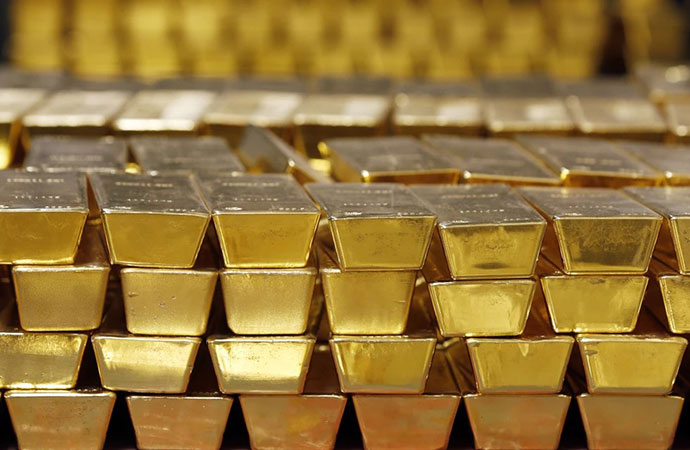Reportage

Photo: AP/UNB
In October of 2024, with precious metal gold in the midst of a rally that had lasted about a year at that point, influential London-based weekly The Economist was moved to declare: "The world has entered a new golden age."
The year-long rally had seen the price of gold surge by 38%, reaching $2700 per troy ounce. In the six months since, gold has continued to enjoy its rather extraordinary renaissance. Earlier this week, the price breached $3500 per troy ounce, briefly, before settling around $3,285 as equity markets rebounded.
The surge in gold prices has sparked intense debate among investors and analysts about whether the precious metal could reach $4,000 per ounce by 2026. Driven by strong central bank demand, geopolitical uncertainties, and shifting monetary policies, gold has already achieved unprecedented highs.
Financial institutions like JP Morgan and Goldman Sachs have issued bullish forecasts, with both predicting a $4,000 target, though their timelines and underlying assumptions differ. JP Morgan emphasizes sustained institutional buying, projecting central bank demand to average 710 tons per quarter in 2025, while Goldman Sachs outlines an extreme scenario where prices could climb to $4,500 under specific market conditions.
Gold's share of central-bank reserves had declined for decades, from almost 40% in 1970 to just 6% in 2008. More recently, though, its share has steadily climbed, rising to 11% last year, the highest in more than 20 years.
The value of a currency may fall both against others and in terms of its purchasing power; gold's relatively fixed supply and historical popularity encourages investors to believe it can protect them against surging prices and misjudged policies. Lots of demand is Asian: China and India make up a fifth of the world's economic output, yet account for half of consumer purchases of physical gold. The average Indian is now about as keen on the metal as an American or German.
Russia's invasion of Ukraine, and the subsequent freezing of its foreign-currency reserves, was a pivotal moment. It demonstrated that if a country was put under sanctions, American Treasuries and other supposedly safe assets denominated in Western currencies would be of no use. Since the start of 2022, monetary authorities in China, Turkey and India have bought 316, 198 and 95 tonnes of gold respectively, according to the World Gold Council.. Central banks mostly accumulate physical gold, and make sure that they have it close to hand: just as financial assets face the possibility of seizure, so does gold held overseas. The British government, for instance, has refused to repatriate dozens of tonnes of gold to Venezuela, since it refuses to recognise Nicolás Maduro as a legitimate leader.
Central-bank demand is unlikely to fall soon. A survey of sovereign investors by Invesco Asset Management last year found that none of the 51 central banks in its study expected to cut their gold allocation in the next three years. Over one-third expected to raise it. Among central bankers, some 56% believe that gold offers protection against the "weaponisation" of central-bank reserves, and 70% saw it as a hedge against inflation.
Demand from central banks, which invest for security reasons rather than returns, also helps explain why gold's relationship with interest rates has broken down. The metal usually does poorly when real yields on safe government bonds are high, which means they provide a solid return even after inflation. Conversely, when returns to the safest bonds are low, gold tends to rally. In a low-yield environment, investors are more likely to consider an asset that produces no income. Since the end of 2021, however, the once-trusty correlation has collapsed. Gold has climbed in price even as yields on ten-year inflation-protected American Treasuries rose from minus 1% to around 1.8%.
How useful will gold be in a crisis? Some experts note that it can be sold in small quantities in the politically neutral Gulf, in exchange for a variety of currencies. Although Russia was also cut off from Western gold markets by the restrictions deployed against the Putin government, and some firms have been punished for dealing with Russian miners, long time insiders suggest Moscow was managing to market its gold. They point to an unexplained surge in gold imports by Switzerland from the United Arab Emirates in the months after the invasion of Ukraine. In any case, preventing the sale of an asset that can be smuggled around the world in small quantities, and melted down without losing value, would seem to represent an almost impossible task.
Bajus in the slipstream
Gold has become even more costly in the local market as the Bangladesh Jewellers' Association (Bajus) has increased the price by Tk10,054 per bhori of good quality gold in two instances this week.
Bajus increased the price by Tk5342 per bhori once, and then again by Tk4712 per bhori this week. They (Bajus) have increased gold price 19 times this year, while they have decreased price 6 times.
Bajus on Tuesday fixed good quality 22-carat gold price at Tk177, 887 per bhori (11.664 grams), which took effect from Wednesday. Earlier on Saturday, Bajus fixed the 22-carat gold price at Tk 167,833 per bhori. On Monday, they fixed the price of the same quality of gold at Tk172,545 per bhori, before another revision the next day , setting the price at Tk 177,887 per bhori.
The global experts however have warned against investing in gold. The BBC in an analysis said that the gold market would be more volatile and individual investors might face difficulties investing in gold.
The price in Bangladesh is even higher than the global market, yet Bajus, headed by Bashundhara Group Managing Director Sayem Sobhan Anvir, keeps increasing the gold price, claiming a price hike in the global market.
Goldman Sachs has forecast that the global price of gold could reach $4000 per ounce by the end of 2025. One ounce equals 31.1035 grams.
Bajus has fixed the 22-carat gold price at Tk14,389 per gram. Accordingly, the local price of one ounce of gold stands at Tk447,548.
But, the current spot price for gold (24-carat) in the United States is approximately $3,328.30 per ounce, equivalent to around Tk402,724 (price and exchange rate on April 20).
This means gold in Bangladesh is being sold at Tk44,824 higher than the international market rate - per ounce. Adjusting for the fact that the US spot price is for pure gold, i.e. 24-carat, you are still looking at a premium in excess of Tk 20,000 per ounce, in the price set by Bajus in Bangladesh.
In addition, Bajus stated that the selling prices of gold and silver must include a 5 percent VAT as mandated by the government. It means a 1-bhori gold ornament of 22-carat gold would cost an eye-wateringTk 196887, or nearly Tk 2 lakh.
As a result, popular stories abound of newlywed couples refraining from using gold and how middle-class families are using other metals instead of gold. There is no reliable estimate or account to back up these claims though. Jewellers claim retail sales of gold ornaments in 2024 dipped as much as 50 percent (annual sales).
The yellow metal gained 24.53 percent over 12 months to end the year at Tk 138,288 per bhori (one bhori is equal to 11.664 grams) in 2024, according to the association. So following the latest adjustments, in 2025, not even 5 months in yet, the price of gold has climbed by around 28% already. Industry insiders say 2024 was gold's best year in more than a generation (since 2010). This year looks set to surpass that.
As per the new pricing, from Wednesday (Apr. 23), hallmarked 22-carat gold is being sold at Tk 177,887 per bhori, 21-carat at Tk169,804 per bhori, and 18-carat at Tk1,45,543 per bhori. Besides, the price of traditional method gold has risen to Tk 1,20,512 per bhori.
On Tuesday, hallmarked 22-carat gold was sold at Tk 172,545 per bhori, 21-carat at Tk164,695 per bhori, and 18-carat at Tk141,169 per bhori. Besides, the price of traditional method gold has risen to Tk 116,779 per bhori.
Bajus increased the price of silver too. In their latest update, 22-carat silver price was fixed at Tk 2846 per bhori, 21-carat silver at Tk 2717 per bhori, and 18-carat silver at Tk 1749 per bhori.
Smuggler's market
The jewellery industry in Bangladesh remains largely dependent on unauthorised channels - a euphemism for smuggling - for sourcing gold, although there is no direct government bar on importing the precious metal. Industry insiders said the taxes on legally importing gold were high, which was the main reason companies felt more comfortable sourcing gold through the so-called 'unauthorised' channels.
Companies source gold by taking advantage of the National Board of Revenue's (NBR's) baggage rules and through other informal avenues. Earlier, a passenger could bring up to 234 grammes of gold paying duties under the NBR's baggage rules. However, if the amount was limited to 100 grammes, no duty had to be paid.
Under a new Baggage Rules-2023, a passenger can bring a maximum of 116 grammes of gold and must pay Tk 40,000 in taxes for it. This is double that for the previous maximum amount.
In 2018, the government framed a policy on gold to boost its import, prevent smuggling and ensure greater transparency in its trade. Bangladesh Bank (BB) awarded licences to 18 companies and a bank to import gold. But these companies have consistently imported well below their permitted amount, despite no lack of demand - indicating their preference for the smuggling routes.
The yearly demand for gold in the local market stood between 20 tonnes and 40 tonnes, according to Gold Policy-2018. About 80 percent of the demand is still met by smuggled gold, as per industry insiders, causing huge revenue losses for the government every year.
Gold smuggling thus goes on unabated in the country with smugglers being regularly nabbed in airports. Illegal gold is also frequently caught during smuggling in border areas.
On 11 February, the Customs Intelligence and Investigation Department detained a passenger with about 3.289kg of gold at Hazrat Shahjalal International Airport. On 27 February, the Bangladesh Border Guard (BGB) seized 2.335kg of gold abandoned in a cowshed in Hudapara, a border area of Damurhuda Upazila, Chuadanga.
The amount of gold seized in the two incidents is 5.624 kg. The current market value of the seized gold is more than Tk 770 million.
The people concerned say that after the political changeover in the country last August, the sheltering of gold smugglers has changed; but smuggling has not stopped. Smugglers continue taking advantage of the law and order situation inside the country and the lack of surveillance at the border.
According to the BGB and the Customs Intelligence and Investigation Directorate (CIID), these two organisations have recovered 143 kg of illegal gold in the seven months from August to February, whose current market value is more than Tk 1.96 billion.
Only a small amount of the smuggled gold is seized. The gold that the BGB and customs intelligence seizes is often done after receiving specific information. In most cases, the smuggled gold remains undetected.
BGB's Director (operations) Lieutenant Colonel SM Shafiqur Rahman told vernacular daily Prothom Aloin an interview recently that recovering smuggled gold is difficult without specific information. Carriers often flee away getting tip-off about raids.
The customs duties on gold imports into India are very high. As a result, gold trade through smuggling is profitable. The price of each kg of gold entering India through smuggling is Rs 800,000 to 900,000 lower.
In the last five years, BGB has seized 725 kg of gold from various border areas of the country. At the same time, the CIID has seized 840 kg of gold from the country's three international airports. The large payoffs mean there is never a shortage of individuals willing to run the risk of acting as a 'mule' - the one carrying the illegal item across the border. Indeed, BGB officers and other law enforcers are of the view that even after August 5, 2024 - when we saw a virtual downgrade of relations with India, given restrictive policies in everything from visas to market access.
The one area in which no such decline would have occurred, say BGB officers without offering their names, between the two countries, would be gold smuggling.

























Leave a Comment
Recent Posts
Bangladesh’s first drought-res ...
In a groundbreaking development for Bangladesh’s agriculture, Ga ...
US and Iran hold another round ...
Iran and the United States were holding another round of indirect talk ...
An early hiccup for the new government?
Japan invites PM Tarique, eyes cooperation with Bang ..
Bangladesh to achieve sustained growth, prosperity u ..
Dhaka indicates ‘forward looking, balanced partnersh ..